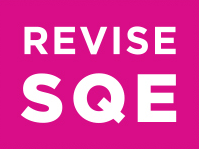Understanding SQE-Related Anxiety
Feeling anxious about the SQE is completely normal and understandable. The assessment represents a significant investment of time, money, and emotional energy, whilst the format differs considerably from traditional legal education methods. Recognising these feelings as a natural response to challenge helps normalise the experience.
The vastly different nature of SQE1 compared to anything you may have done previously can feel quite daunting. Considering how to prepare for the SQE – specifically 360 single best answer multiple-choice questions, spanning eleven different substantive topics, especially given that it is ‘closed book’ – represents a genuine challenge requiring systematic approach and emotional resilience.
Practical Strategies for Managing Stress
Preparation-Focused Approaches
Thorough preparation provides the most effective foundation for managing anxiety. Understanding the assessment format, practising with realistic questions, and developing systematic approaches to different question types builds confidence whilst reducing uncertainty.
Regular practice with timed assessments helps familiarise yourself with the pressure of working under time constraints. This experience reduces anxiety on assessment day by making the conditions feel familiar rather than threatening.
Lifestyle and Wellbeing Considerations
Maintaining physical health supports mental resilience during intensive study periods. Regular exercise, adequate sleep, and proper nutrition provide the foundation for sustained intellectual effort whilst supporting emotional wellbeing.
Building social support networks helps maintain perspective during challenging preparation periods. Connecting with other SQE candidates, maintaining relationships with friends and family, and seeking professional support when needed provides essential emotional resources.
Mindfulness and Stress Management
Developing mindfulness practices helps manage anxiety whilst improving concentration during study sessions. Simple breathing exercises, meditation, or progressive muscle relaxation techniques provide practical tools for managing stress responses.
Regular breaks and leisure activities prevent burnout whilst maintaining motivation throughout the extended preparation period. Balance between intensive study and relaxation supports both learning effectiveness and emotional wellbeing.
Assessment Day Anxiety Management
Pre-Assessment Preparation
Plan your assessment day logistics carefully, including travel arrangements, arrival time, and what to bring. Reducing uncertainty about practical arrangements allows you to focus on the assessment itself rather than worrying about logistics.
Develop a pre-assessment routine that helps you feel calm and focused. This might include specific breakfast choices, arrival timing, or relaxation techniques that help you feel prepared and confident.
During the Assessment
Remember that some nervousness is normal and can actually enhance performance when managed effectively. Focus on the immediate task rather than worrying about outcomes or consequences beyond your control.
Use the systematic question approach you’ve practised during preparation. Trust in your preparation and apply the techniques you’ve developed rather than second-guessing yourself under pressure.
When Anxiety Becomes Overwhelming
If anxiety significantly impacts your ability to study effectively or maintain daily functioning, consider seeking professional support. Many educational institutions and healthcare providers offer counselling services specifically designed to support students facing academic challenges.
Remember that seeking help demonstrates strength and self-awareness rather than weakness. Professional support can provide additional strategies and perspectives that enhance your ability to manage the challenges of SQE preparation.
Building Resilience for Professional Practice
The SQE preparation process, whilst challenging, provides valuable experience in managing professional pressure and developing resilience. These skills prove essential in legal practice, where managing stress whilst maintaining professional standards represents a core competency.
Viewing the preparation process as professional development rather than simply an academic challenge helps maintain perspective and motivation. The skills you develop in managing SQE preparation – time management SQE strategies, stress resilience, systematic approach to complex problems – directly transfer to successful legal practice.
Remember these Key Preparation Strategies
These fundamental SQE study tips form the foundation of a healthy and successful SQE exam strategy:
- Start with a plan: Map out your study timeline realistically
- Make sure you’re up to date: Ensure your study aligns with the current SQE specification
- Practise, practise, practise: Especially those single best answer multiple choice questions
- Build your confidence gradually: Systematic development is essential for legal expertise
- Take care of yourself: This journey requires stamina, so pace yourself
